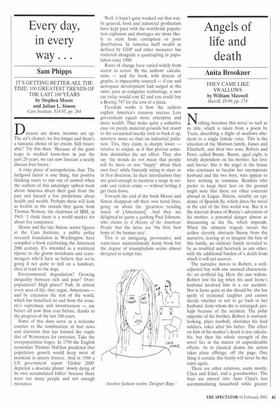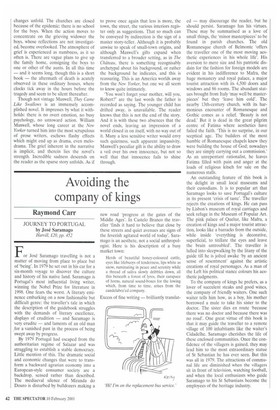Angels of life and death
Anita Brookner
THEY CAME LIKE SWALLOWS by William Maxwell Hamill, £9.99, pp. 174 Nothing becomes this novel so well as its title, which is taken from a poem by Yeats, describing a flight of swallows obedient to a single female voice. This is the situation of the Morison family, James and Elizabeth, and their two sons, Robert and Peter, called Bunny. Bunny, aged eight, is totally dependent on his mother, her love and favour. She is the angel in the house who continues to becalm her intemperate husband and the two boys, who appear to have nothing in common. Readers who prefer to keep their feet on the ground might note that there are other concerns abroad in Logan, Illinois, notably an epidemic of Spanish flu, which dates the novel at the end of the first world war. But it is the internal drama of Bunny's adoration of his mother, a potential danger almost as threatening as the flu, which impends. When the ultimate tragedy occurs the author cleverly abstracts Bunny from the narrative, leaving us to imagine the fate of this family, an ordinary family revealed to be as troubled and heartsick as any other, with the additional burden of a death from which it will not recover.
The narrative moves to Robert, a welladjusted boy with one unusual characteristic: an artificial leg. Here the cast widens. Robert lost his leg when his aunt Irene's husband involved him in a car accident. Nor is Irene quite as she should be: she has spells of irrational laughter and cannot decide whether or not to go back to her husband, from whom she is estranged, perhaps because of the accident. The polar opposite of his brother, Robert is outwardlooking, plays football, cherishes his lead soldiers, takes after his father. The effect on him of his mother's death is less calculable, but then the whole strength of the novel lies in the matter of unpredictable effects. As in classical drama the action takes place offstage, off the page. One thing is certain: this family will never be the same again.
There are other relations, aunts mostly, Clara and Ethel, and a grandmother. The boys are moved into Aunt Clara's less accommodating household while greater changes unfold. The churches are closed because of the epidemic; there is no school for the boys. When the action moves to concentrate on the grieving widower the boys, whose reflections are not investigated, become overlooked. The atmosphere of grief is experienced as numbness, as it so often is. There are vague plans to give up the family home, consigning the boys to one or other of the aunts. In all this time — and it seems long, though this is a short book — the aftermath of death is acutely observed in these ordinary houses, where clocks tick away in the hours before the tragedy and seem to be silent thereafter.
Though not vintage Maxwell, They Came Like Swallows is an immensely accomplished novel. It impresses by what it withholds: there is no overt emotion, no busy psychology, no untoward action. William Maxwell, whose long career at the New Yorker turned him into the most scrupulous of prose writers, eschews flashy effects which might end up as drama, even melodrama. The grief inherent in the narrative is implicit, and therein lies the novel's strength. Incredible sadness descends on the reader as the sparse story unfolds. As if to prove once again that less is more, the town, the street, the various interiors register only as suggestions. That so much can be conveyed by indirection is the sign of a master story-teller. Although it is probably unwise to speak of small-town origins, and although Maxwell's gifts expand when transferred to a broader setting, as in The Château, there is something recognisably archetypal about his background, or rather the background he indicates, and this is reassuring. This is an America worlds away from the New Yorker, but one we all seem to know quite intimately.
'You won't forget your mother, will you, Robert?' are the last words the father is recorded as saying. The younger child has drifted away, is unavailable. The reader knows that this is not the end of the story. And it is with these two absences that the novel ends, leaving an impression of a world closed in on itself, with no way out of it. Many a less sensitive writer would envy such quietness, such apparent impassivity. Maxwell's peculiar gift is the ability to draw a veil over his own innocence, but not so well that that innocence fails to shine through.



































































 Previous page
Previous page